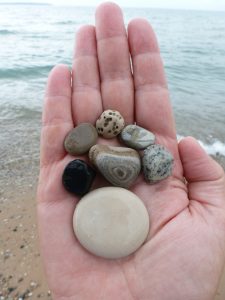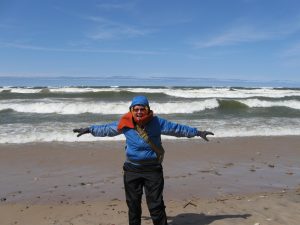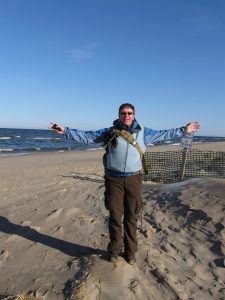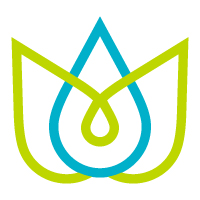LIVING SUSTAINABLY
Get up close with the Great Lakes
By Michelle Gibbs, Holland-Hope College Sustainability Institute
 Asked where they’re from, Michigan residents know the drill: Hold up your hand and point. We take pride in being from this amazing state with its state motto, “If you seek a pleasant peninsula, look about you.” We are blessed to be surrounded by such beauty.
Asked where they’re from, Michigan residents know the drill: Hold up your hand and point. We take pride in being from this amazing state with its state motto, “If you seek a pleasant peninsula, look about you.” We are blessed to be surrounded by such beauty.
Water is a part of our natural environment and a necessity for all living creatures; it’s also part of our culture. We depend on it economically, for farming, energy production, tourism, fishing, and movement of goods and people, and we rely on it for personal enjoyment and recreation.
We all live in a watershed to these lakes that hold 84 percent of North America’s fresh surface water, and our choices impact this precious resource. So, it is important to not take this resource for granted and to get to know it on a personal basis.
In 2009, Loreen Niewenhuis walked the perimeter of Lake Michigan and wrote the bestselling book, “A 1,000-Mile Walk on the Beach.” She wanted to put her boots to the ground and connect more with herself and the natural environment.
 “Lake Michigan has always been my favorite place, and walking the edge where land meets water is where I feel most at home,” she says.
“Lake Michigan has always been my favorite place, and walking the edge where land meets water is where I feel most at home,” she says.
In 2012, Niewenhuis took another long journey, covering 1,000 miles of shoreline touching all five Great Lakes. The book about this latest adventure, “A 1,000-Mile Great Lakes Walk,” explores the entire Great Lakes system.
The Holland-Hope College Sustainability Institute and Herrick Library’s “Booked for the Summer” Program are excited to present on July 31 at the library a discussion by Niewenhuis about her adventures.
Niewenhuis will take you along the shores of all five Great Lakes and many of the waterways connecting them. In words, photos, and video, you’ll explore the geology, hydrology, and natural history of the largest system of freshwater lakes in the world.
Niewenhuis also will illuminate the threats to this massive ecosystem: Invasive species, pollution, destruction of wetlands, and the gradual warming of the lakes.
As a tickler for the event, I encourage to you think about the following questions that she will answer. Also, come prepared to ask your own questions.
What was her shortest day and longest days of hiking?
How many pairs of shoes did she use?
What stretch of shoreline was the most difficult to hike?
Where does Lake Michigan rank in size compared to other freshwater lakes in the world?
 “I reached a point in my life where I needed to take on a big challenge, something so big it scared me,” Niewenhuis said. “I looked to my favorite place, Lake Michigan, and decided to get to know it step-by-step, to record it in my muscles and bones.”
“I reached a point in my life where I needed to take on a big challenge, something so big it scared me,” Niewenhuis said. “I looked to my favorite place, Lake Michigan, and decided to get to know it step-by-step, to record it in my muscles and bones.”
We invite you to hear about her exciting and inspiring adventure!
Fast Facts
The Great Lakes represent 84 percent of North America’s surface fresh water
The Great Lakes hold about 21 percent of the world’s supply of surface fresh water.
People say no matter where you are in Michigan, you’re never more than six miles from a body of fresh water.
If You Go:
What: Free presentation by Loreen Niewenhuis, author of “A 1,000-Mile Great Lakes Walk.”
When: 7 p.m., Monday, July 31
Where: Herrick District Library, 300 S. River Ave.
Michelle Gibbs is the director of the Holland-Hope College Sustainability Institute. The vision for the Institute is a healthy and economically vibrant community that promotes environmental stewardship and mutual respect for people and the planet. Its mission is to foster collaborative efforts to infuse sustainability into the minds and practices of the greater Holland community.
PHOTO CUTLINES –
NearSaug.jpg – Loreen Niewenhuis stands in awe of the power of Lake Michigan, which she walked around and wrote a book about.
Southernshore.jpg – Loreen Niewenhuis crossed the southern shore of Lake Michigan through from Illinois, through Indiana, to Michigan.
Lakestones.jpg – The beauty of stones from Lake Michigan helped inspire Loreen Niewenhuis as she walked around the lake.
![]() This Week’s Sustainability Framework Theme:
This Week’s Sustainability Framework Theme:
Environmental Awareness/Action: Environmental education and integrating environmental practices into our city planning will change negative outcomes of the past and improve our future state.
 ABOUT THIS SERIES:
ABOUT THIS SERIES:
Living Sustainably is a collection of community voices sharing updates about local sustainability initiatives. It is presented by the Holland-Hope College Sustainability Institute, a joint project of Hope College, the City of Holland and Holland Board of Public Works. Go to www.hope.edu/sustainability-
institute for more information.

